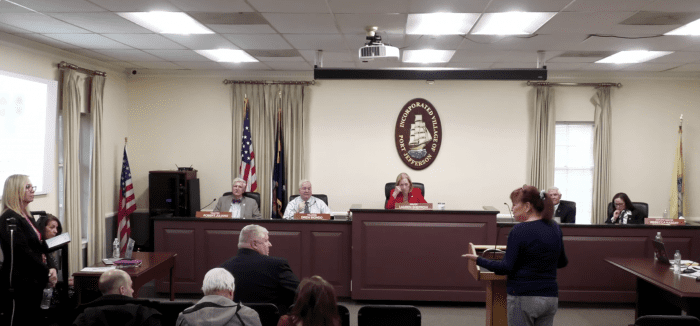Port Jeff school budget and village parking take spotlight at trustees meeting
By Lynn Hallarman
During the April 24 Village of Port Jefferson Board of Trustees meeting, discussions surrounding the Port Jefferson school district budget for the year 2024-25 and the new village parking initiative took center stage.
School budget
Deputy Superintendent Sean Leister provided a detailed overview of the school district’s financial landscape, emphasizing ongoing challenges. These challenges include an uncertain timeline for resolving the Child Victims Act litigation and decreases in revenue due to the LIPA glide path agreement.
Leister reported that the Board of Education deliberated extensively on budget allocations for the upcoming year, focusing on necessary construction projects. Due to budget constraints, the school board approved four projects totaling $1 million. These projects relate to demolishing a no-longer-habitable high school portable classroom, renovating the high school orchestra room, renovating the elementary school pool and continuing a roofing project.
Reduced enrollment prompted reductions in staff positions, amounting to 3.6 full-time equivalent positions.
“I don’t say this lightheartedly for any reduction for a staff member is tough, but someone may be reduced from 100% to 80% meaning going from five classes to four,” Leister said.
The budget breakdown highlighted that 77% of the district’s funding goes to salaries and benefits.
“Once you take into account collective bargaining agreements, state regulations and state mandates, of this whole budget probably only about 4% is controllable,” he said.
Leister noted increases for the coming year in medical insurance (10%), liability insurance (4%), teacher retirement insurance (9.76%-10.25%) and utilities (4%).
Mayor Lauren Sheprow sought clarity on the reserve funds in the budget presentation. Leister indicated that the presentation did not explicitly state the details of the reserve funds. However, residents can find information about the funds on the district’s website. Leister summarized for the mayor a general breakdown of the reserve into six parts that comprise a fund for workers compensation, unemployment insurance, spikes in the retirement system, the teachers and civil service unions, and capital projects.
“Right now, our capital reserve fund is $3.1 million. We use that to do different capital projects. The way we fund it is when we have a surplus at the end of a given year — the board will pass a motion to fund that reserve up to no more than $1.5 million each year,” Leister said.
Trustee Drew Biondo asked, “Is there any working group going on to bring the community in and talk about what we are doing as a district as our enrollment drops and how we maintain our services?”
Sheprow responded, “In fact, the village created a school district interactive working group in response to taxpayer feedback about this issue. My perspective is that it is about building trust with community members to show that you are listening to them and being fiscally responsible.”
The 2024-25 second draft budget is projected at $48,018,335 ($47,066,099 in 2023-24), an increase of 2.02%.
The total amount of taxes levied by the school district for the 2024-25 academic year is estimated at $39.8 million ($39.3 million), a 1.24% increase.
The vote for or against the 2024-25 budget will be held at the Earl L. Vandermeulen High School cafeteria on Tuesday, May 21.
Managed parking
Andrew Freleng, director of the Building & Planning Department, reported on the progress of the newly-implemented parking management system. His presentation reviewed the village’s recent effort to streamline its parking infrastructure and improve user experience. The new system departs from previous practices, informed by operational recommendations from the parking committee.
The initiative kicked off with the removal of redundant signage and simplified messaging. The new system also retooled pay stations to emphasize functionality and user experience.
Freleng emphasized the use of empirical data to inform operational decision-making. The overall approach is to refine the parking management strategy over time in response to data-driven outcomes such as revenue generated and community feedback.
Managed parking in the village began April 15. Homeowners must each renew their virtual permit to park for free in village lots every two years. Renters renew every year.







